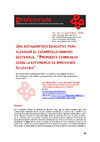Identificador persistente para citar o vincular este elemento:
https://accedacris.ulpgc.es/handle/10553/77832
| Campo DC | Valor | idioma |
|---|---|---|
| dc.contributor.author | Moya Otero, José | en_US |
| dc.contributor.author | Hernández Ortega, José | en_US |
| dc.date.accessioned | 2021-02-23T20:45:35Z | - |
| dc.date.available | 2021-02-23T20:45:35Z | - |
| dc.date.issued | 2020 | en_US |
| dc.identifier.issn | 1138-414X | en_US |
| dc.identifier.other | Scopus | - |
| dc.identifier.uri | https://accedacris.ulpgc.es/handle/10553/77832 | - |
| dc.description.abstract | This article analyzes the different challenges that must be undertaken for an educational transformation within a society marked by the emergence of COVID-19. The educational quality proposal formulated by the United Nations (UN) through the Sustainable Development Goals (SDGs) within the 2030 agenda makes it necessary to analyze the elements that we consider essential in the current educational scenario. The itinerary of the Atlántida educative researching group is analyzed to see how the curriculum, learning scenarios, school digitization and the role of the family in the educational framework are the focus of analysis that, based on the bibliographic review of the trajectory of the group, allow us to identify where educational and social policies should be directed to benefit equitable and qualitative access for students in post-COVID-19 society. School must be the main agent of social change that trains individuals capable of creating a sustainable world based on the competences of the learning process. | en_US |
| dc.description.abstract | En el presente artículo se analizan los distintos retos que se deben acometer para una transformación educativa dentro de una sociedad marcada por la irrupción de la COVID-19. La propuesta de calidad educativa formulada por la Organización de las Naciones Unidas (ONU) a través de los Objetivos de Desarrollo Sostenible (ODS) dentro de la agenda 2030 hace necesario el análisis de los elementos que consideramos esenciales en el actual escenario educativo. Currículum, escenarios de aprendizaje, digitalización escolar y papel de la familia en el marco educativo son el foco de análisis que, a partir de la revisión bibliográfica, nos permiten identificar hacia dónde se deben dirigir las políticas educativas y sociales en beneficio del acceso equitativo y cualitativo del alumnado de la sociedad post COVID-19. La escuela debe ser el principal agente de cambio social que forme individuos capaces de crear un mundo sostenible a partir de las competencias propias del proceso de aprendizaje. | en_US |
| dc.language | spa | en_US |
| dc.relation.ispartof | Profesorado | en_US |
| dc.source | Profesorado [ISSN 1138-414X], v. 24 (3), p. 149-173, (Noviembre 2020) | en_US |
| dc.subject | 5802 Organización y planificación de la educación | en_US |
| dc.subject | 630706 Desarrollo socio-económico | en_US |
| dc.subject.other | Educational Innovation | en_US |
| dc.subject.other | Educational Quality | en_US |
| dc.subject.other | Educational Technology | en_US |
| dc.subject.other | Learning Modalities | en_US |
| dc.subject.other | Sustainable Development | en_US |
| dc.subject.other | Calidad educativa | en_US |
| dc.subject.other | Desarrollo sostenible | en_US |
| dc.subject.other | Innovación educativa | en_US |
| dc.subject.other | Modalidades de aprendizaje | en_US |
| dc.subject.other | Tecnología educativa | en_US |
| dc.title | Una metamorfosis educativa para alcanzar el desarrollo humano sostenible. “Propuesta curricular desde la experiencia de innovación Atlántida” | en_US |
| dc.title.alternative | An educational metamorphosis to achieve sustainable human development. Curricular proposal from the Atlántida innovation experience | en_US |
| dc.type | info:eu-repo/semantics/Article | en_US |
| dc.type | Article | en_US |
| dc.identifier.doi | 10.30827/PROFESORADO.V24I3.15971 | en_US |
| dc.identifier.scopus | 85100526691 | - |
| dc.contributor.authorscopusid | 57221920853 | - |
| dc.contributor.authorscopusid | 57208683674 | - |
| dc.identifier.eissn | 1989-6395 | - |
| dc.description.lastpage | 173 | en_US |
| dc.identifier.issue | 3 | - |
| dc.description.firstpage | 149 | en_US |
| dc.relation.volume | 24 | en_US |
| dc.investigacion | Ciencias Sociales y Jurídicas | en_US |
| dc.type2 | Artículo | en_US |
| dc.utils.revision | Sí | en_US |
| dc.date.coverdate | Noviembre 2020 | en_US |
| dc.identifier.ulpgc | Sí | en_US |
| dc.contributor.buulpgc | BU-EGB | en_US |
| dc.description.sjr | 0,341 | |
| dc.description.sjrq | Q3 | |
| dc.description.sellofecyt | Sello FECYT | |
| dc.description.esci | ESCI | |
| dc.description.fecytq | Q1 | |
| dc.description.fecytpuntuacion | 54,9 | |
| dc.description.dialnetimpact | 1,0 | |
| dc.description.dialnetq | Q1 | |
| dc.description.dialnetd | D2 | |
| dc.description.erihplus | ERIH PLUS | |
| item.grantfulltext | open | - |
| item.fulltext | Con texto completo | - |
| crisitem.author.dept | Departamento de Educación | - |
| crisitem.author.fullName | Moya Otero, José | - |
| Colección: | Artículos | |
Citas SCOPUSTM
8
actualizado el 08-jun-2025
Citas de WEB OF SCIENCETM
Citations
5
actualizado el 08-jun-2025
Visitas
796
actualizado el 15-jun-2024
Descargas
406
actualizado el 15-jun-2024
Google ScholarTM
Verifica
Altmetric
Comparte
Exporta metadatos
Los elementos en ULPGC accedaCRIS están protegidos por derechos de autor con todos los derechos reservados, a menos que se indique lo contrario.
